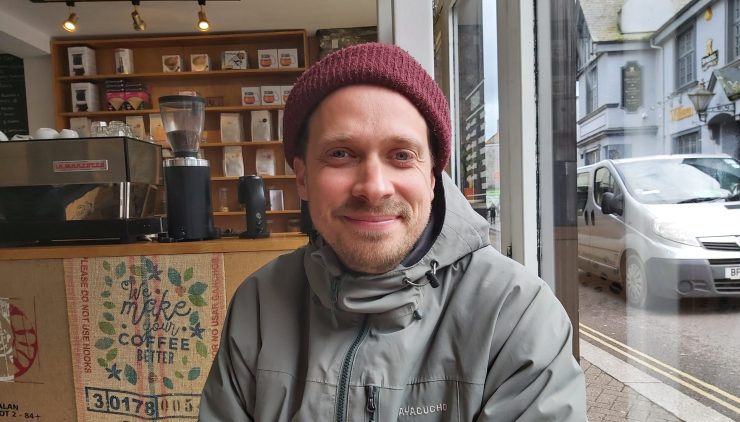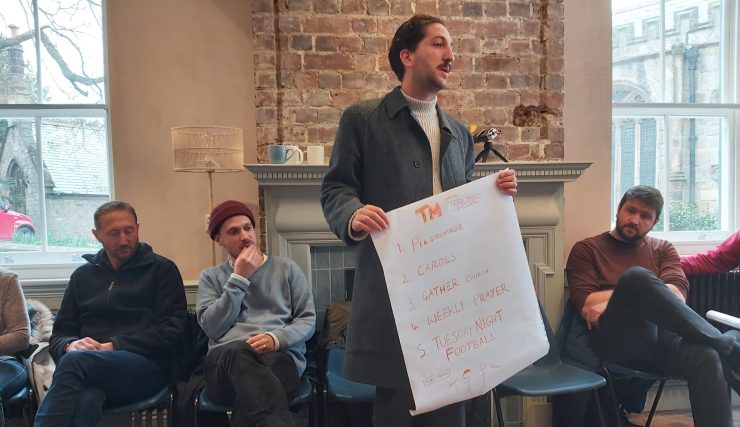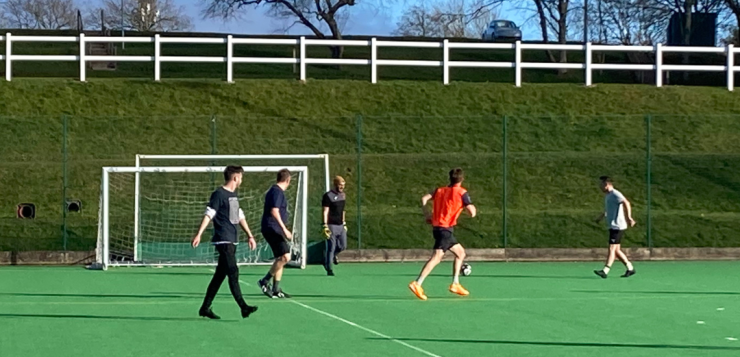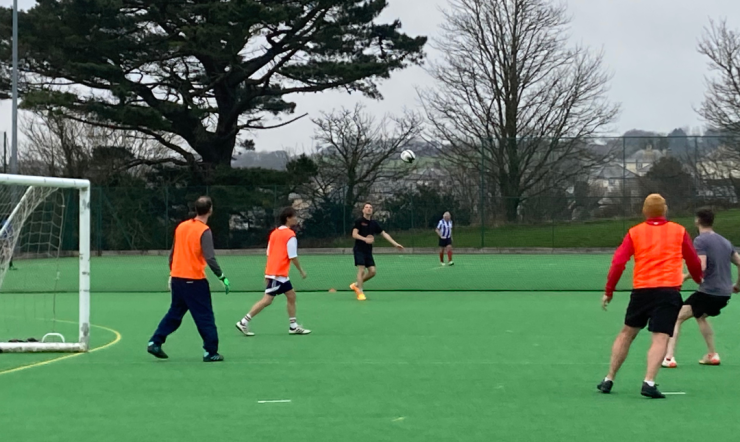The beautiful game
In spring 2021, many British people were starting to plan what they might do once the third national Covid-19 lockdown was done. We were starting to hope and plan and dream again.
It was then that a group of friends in Truro had an idea. They resolved that at the first opportunity they were going to start playing football together once a week. They expected their physical and mental health would gain much-needed benefits from it.
It started with just five of them, but over the months their group began to grow. And grow.
Two years on, there are now more than forty of them. They hire the football ground at Truro School every Tuesday evening. Each week, up to eighteen of them get to play.
They range widely in ages, backgrounds and footballing skills.
“Some are Christian, some aren’t,” explains founding member Joff Phipps. “They come from different walks of life. Some are looking to find friendship, some to get fit, some to support their mental health.
“We were trying to be different from other football groups. You could join us and find a warm welcome – and no judgment – however good or bad you were. It’s a friendly and inclusive space. We call it Truro’s friendliest kickabout.”
“We’ve tried to create a space where people can come, whatever their ability, and feel really welcome,” adds Robin Mitchell, Joff’s partner in Transforming Mission Truro.
Within a few months, they had people coming from as far afield as Wadebridge, St Austell and Falmouth.
Transforming lives
It’s a Christian group but Joff emphasizes that it offers a subtly different ethos from some other such gatherings.
“Many people wouldn’t know it’s a Christian thing,” Joff says. “The intention isn’t to get people into church but to introduce them to the ways of the kingdom of God through how we treat each other.”
It also presents a very different approach from other amateur football groups.
“One guy said to me recently that it’s so nice not to be sworn at every other minute on the pitch,” Josh explains. “We’re about supporting each other, about cheering each other on.”
This Truro football group is one of various activities – including work with aspiring musicians, poets and creative artists – that Joff and Robin are engaged in as part of the Transforming Mission initiative in Cornwall. They say it’s about finding forms of Christian mission which can best help to transform people’s lives.
“We want to create spaces for community flourishing and places to get to know local people,” Joff says. “It’s about transforming relationships. It’s about love for the place where you are.
“We’re focused on creating Christian community. We believe this community is about invitation to a relationship with Jesus, as well as the spiritual transformation of self to become like Jesus – which includes a transformation of culture to embody the love of God.
“Because we don’t have a church building, we’ve had to be a bit more creative in how we do things. If you step into places of the greatest deprivation, you’re more likely to find Jesus than at a church pew.”
So Joff and Robin have pursued their mission in the cafés and pubs of Truro and across the beaches of Cornwall, as well as on our football fields.
But more traditional churches in the diocese have also come to embrace similar outreach strategies.
God’s footballers
Just to the southwest of St Austell, the parish of St Goran is currently building a partnership with the British branch of the international Christian soccer network Ambassadors Football.
Based in the United States, Ambassadors Football is “a global organisation that connects people to Jesus through football”.
This Cornish initiative is being developed in collaboration with Gorran School and is scheduled to run four days of faith-based football at the start of the summer holidays.
Supported by his Parochial Church Council, St Goran’s John Woodbridge is the man behind it.
“I know Ambassadors Football very well,” John explains. “They do an excellent job both in this country and overseas.”
John believes that the soccer programme will play an important part in supporting the life aspirations of the young people involved.
“They’ll enjoy the football and will enjoy some words about Jesus too,” he says. “It’s about spreading the good news.”
Meanwhile, in Newquay, church members are working to support the provision of football training at local schools, as part of an ongoing social outreach plan.
“Part of what we do is giving up some of our time to support such activities involving young people,” says Nick Freeman, youth leader at St Gregory’s. “It’s a great way to get to know people and to build links.”
Frankly, Mr Shankly
It was, of course, the legendary Liverpool manager Bill Shankly who observed that some folk thought that football was a matter of life and death. Mr Shankly confessed he was very disappointed by that attitude. Football was, he famously supposed, much, much more important than that.
Bill Shankly also described the relationship between a club’s manager, player and supporters as a holy trinity. He understood that for many people the game encompassed and enlivened the soul of a community, a city or a nation.
It’s a medium of earthly miracles generally rather more genuine than Diego Maradona’s invocation of the hand of God. For millions, it represents the site of their weekly worship, in what the singer Billy Bragg once called “the rituals of a Saturday afternoon”.
For, as Bragg sang in his 1991 tribute to a player nicknamed ‘God’s Footballer’, “beyond the sport lies the spiritual”.
And so, each weekend, the crowds, congregated in fellowship, there in the arenas of shared hopes and dreams, chant hymns to their rival, common faiths.
Glory, Glory, Hallelujah. Bread of Heaven. You’ll Never Walk Alone.




